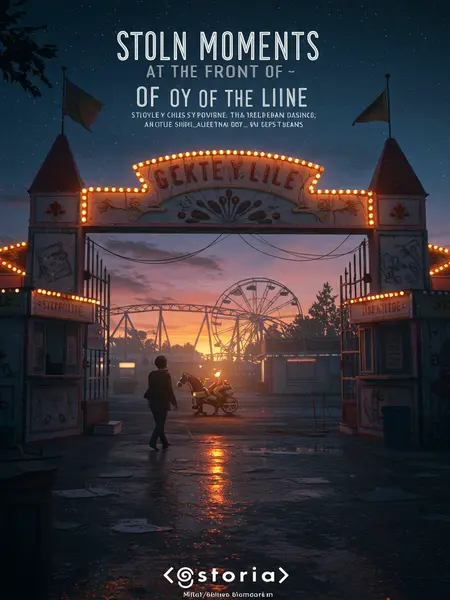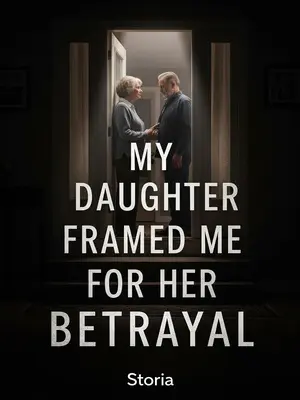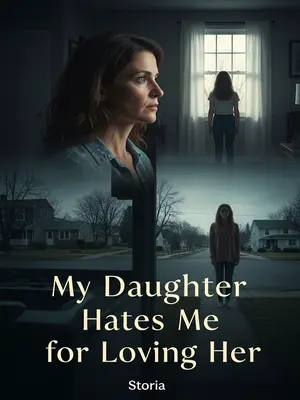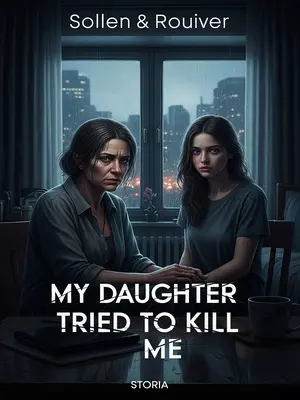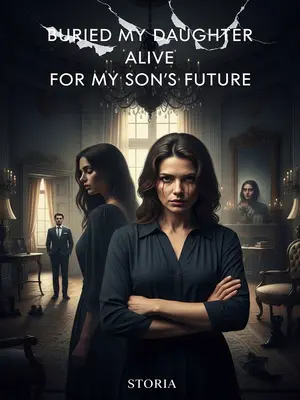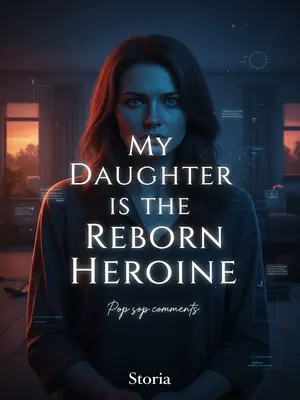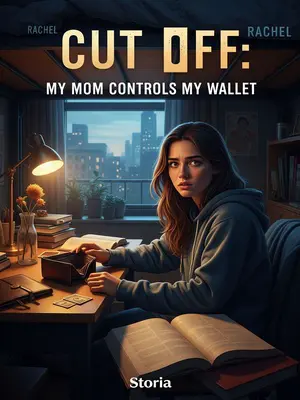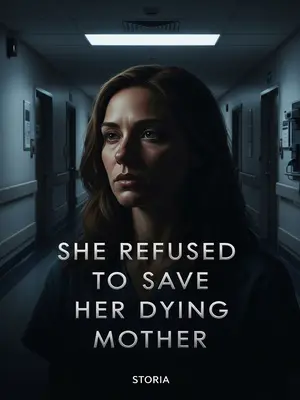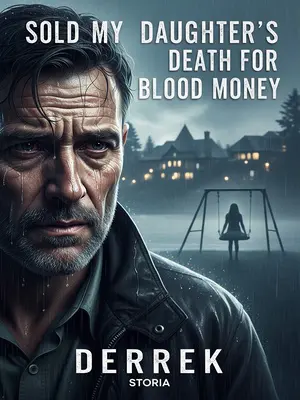Chapter 1: The Line That Broke the Rules
Memorial Day weekend at the amusement park felt like standing on a skillet. The air shimmered, and the concrete radiated heat up through my sneakers as I waited in line with my daughter. Natalie, my nine-year-old, wore her hair in pigtails and squeezed my hand, her eyes wide with anticipation. She bounced on her toes, craning her neck every time a coaster car screamed past.
It was almost our turn when the guy in front of us suddenly waved toward the shaded picnic area and hollered, "Hey, everyone, come over!"
I blinked, expecting a handful of people. Instead, a whole crowd—must’ve been fifty people—poured out from under the shade, crumpling chip bags and slapping each other’s backs like they’d just won the Super Bowl. They joined the guy in front of us, turning the line into a human wall.
Stunned, I quickly said, "Hey, man, you can’t seriously be saving the whole line for all those people. Mind if we go ahead?" My voice was steady, but I could feel my irritation rising, trying to keep it polite for my daughter's sake. Inside, my heart was pounding. I could feel Natalie’s small fingers tense around mine—she knew something wasn’t right.
He glared at me and snapped, "Don’t cut in line." His voice boomed, catching the attention of a few people near the game booths.
I was completely baffled. How did I become the one accused of cutting in line? It was like he’d flipped the whole script and suddenly I was the jerk, not the guy who just multiplied the line in front of us by five.
Today was special: Natalie was on break and had just scored a perfect 100 on her midterm. I’d promised to take her to ride the roller coaster. She'd been talking about this day for weeks. Every night, she’d ask how many more sleeps until roller coaster day. I’d marked it on the fridge calendar in red Sharpie. I'd left work early to keep my word.
It was sweltering, and we’d been waiting patiently. Now, suddenly, dozens more people appeared in front of us. How was that fair? Sweat trickled down my neck, and I could see Natalie shifting from foot to foot, the thrill of the day starting to slip away. Somebody behind us was fanning themselves with a park map, and the air smelled like sunscreen and funnel cake.
Worried, I asked the staff, "If all these people get on, will we still get a chance to ride the roller coaster?" I tried to sound calm, but there was a tightness in my voice. The staff had the glazed look of someone who’d spent eight hours refereeing line disputes and mopping up spilled slushies.
The staff counted the crowd and asked the guy in front, "How many people do you have exactly?"
He quickly replied, "Fifty. Just right." He said it like he’d just won a prize at the county fair, puffed up with pride.
I took a deep breath. The staff then said, "The roller coaster can take at most ten people at a time. After five rounds, the ride will close." My stomach dropped. We were right on the edge—one more group and we’d be out of luck. His tone was apologetic, but also resigned, like this kind of thing happened more often than people realized.
With that, he brought over a sign that read 'Temporarily Closed' and was about to put it up in front of us. The bright red letters looked even harsher in the afternoon sun.
I grabbed the sign, raising my voice, "Then we should go first! Why is he allowed to hold a spot for fifty people?" I wasn't trying to make a scene, but I was determined not to let my daughter's day be ruined by someone else's rudeness. My voice cracked, echoing off the carousel music in the distance.
Anyone who’s been to an amusement park knows: there are day and night sessions, and the daytime session has a time limit. Once time’s up, a lot of rides close. On holidays, you often have to skip other attractions just to wait in line for your favorite. Every parent in line knew the drill—sacrifice a little to get that one magic ride. I caught a couple of tired moms rolling their eyes, and a dad behind us muttered, “Unbelievable.”
Earlier, Natalie had wanted to ride both the giant swing and the roller coaster. She gave up the swing to wait for the roller coaster. We’d made a choice, just like everyone else—except apparently the guy in front, who found a loophole big enough for a marching band.
Now, if we switched to the swing, it would be too late. The lines had ballooned everywhere.
She rarely gets a perfect score, and I’d promised her this treat. If people cut in line, would we spend this special day just waiting? The idea made my jaw clench.
My jaw tightened. I could feel the sweat trickling down my back, but my anger burned hotter. The man in front grew impatient. He jabbed his finger at me and demanded, "Tell me, am I not in this line?" He was in my face now, his group looming behind him like backup in a bar fight.
I replied, "If you’re holding a spot for fifty people, you should have told those behind you. If I’d known there were fifty people ahead, I wouldn’t have lined up here." My voice was calm, but inside I was boiling, trying not to set a bad example for Natalie.
His hand hit my shoulder, and I stumbled back, the metal barrier digging into my side. He shoved me, snatched the staff’s sign, and planted it right in front of us. The plastic sign clanged against the metal barrier.
My daughter, Natalie, looked crestfallen. She asked in a small, hurt voice, "Daddy, can’t we ride?" Her lower lip trembled, and I could see the hope draining from her eyes. She blinked fast, fighting tears, and looked away so I wouldn’t see.
Seeing her disappointed face, my heart ached. I wanted to hug her, shield her from the unfairness of the world, but all I could do was clench my fist at my side. I wanted to punch something. Instead, I just squeezed her hand harder.
She’d endured the heat for ninety minutes without complaining, just for this one roller coaster ride. How could I let her down? I remembered the look on her face when she showed me her perfect test—she deserved better than this.
I spoke firmly to the staff, "Come on, man—how is this fair? We’ve been sweating out here for over an hour while they were chilling with their snacks." I motioned toward the picnic tables, where empty soda cans and chip bags still littered the benches.
The staff, seeing I wanted to argue, quickly waved his hands. "Please resolve this among yourselves." He sounded like he’d rather be anywhere else, maybe even flipping burgers at the snack stand.
I was dumbfounded. Seriously? Wasn’t it the staff’s job to keep things orderly? I looked around for a manager, but none were in sight.
As expected, businesses love to dodge responsibility, pushing conflict onto customers instead of taking a stand. I could almost hear my dad’s voice in my head, grumbling about the 'customer is always wrong' attitude these days.
I held onto the sign and declared, "No matter what, I have to ride today. This is unfair." My voice rang out louder than I expected, and a few folks at the ice cream cart turned to watch.
Seeing I wouldn’t back down, the staff reluctantly told the man in front, "Then two people from your group won’t be able to ride. After five rounds, the ride will close for sure." He shuffled his feet, clearly hoping this would end the standoff.
The man panicked. "No way! I took their money—what if they want a refund?" He started gesturing wildly, looking around as if reinforcements might appear from the funnel cake line.
Now I understood: he was a tour guide, holding the place for his whole group. It all clicked—why he was so aggressive, why he kept counting heads. Probably hustling to keep his Yelp reviews up.
He blocked me, gritting his teeth. "Listen, I was ahead of you. No matter how many people I have, I’m ahead. Don’t make trouble for me." His words were clipped, jaw tight, like someone who’s had one too many bad days.
I was about to reply, but Natalie stepped forward, chin up, her voice stronger than I expected from someone her size. Her voice was clear and serious. For a moment, I was both proud and worried for her.
"Sir, this isn’t right. Our teacher says when you’re in line, one person only takes one spot. If you have fifty people, you should bring all fifty to line up." She stood up straighter, her eyes bright with conviction.
Natalie’s logic was sound, but the tour guide exploded. "Hey, kid, keep mouthing off and you’ll be sorry!" The threat hung in the humid air, ugly and real. A couple of people nearby gasped. One mom pulled her own kid closer.
I quickly shielded Natalie behind me and shouted, "What are you doing? You want to hit someone?" My voice was shaking now, adrenaline surging as I positioned myself between him and my daughter.
He sneered, "Who’s afraid of a fight?" His group shuffled closer, some crossing their arms, others pulling out their phones, ready to record whatever happened next.
Seeing his numbers, he called out to his group, "Someone here wants to cut in line and fight! Guys, stand with me! Let single women go first, then couples, then single men squeeze in." It sounded like he was assigning a defensive line, as if we were in some backyard football brawl.
At his command, dozens of men from the group blocked our way, glaring at me. The line wasn’t a line anymore—it was a wall. And we were on the wrong side.
The tour guide smirked, "Come on, keep acting tough. Aren’t you the one trying to cut in?" The group behind him snickered, emboldened by his bravado.
Two men, clearly annoyed, suddenly shoved me hard in the chest, trying to force me back. I stumbled, catching myself on the metal rail, feeling my face flush with humiliation and anger.
I was seething. My knuckles whitened as I steadied myself. It was like the world had flipped upside down—he was the one cutting in line, yet somehow I’d become the problem.
He was the one cutting in line—how did I become the problem? The injustice of it all made my head pound, and I could see Natalie looking up at me, searching my face for what to do next.
I followed the rules, so why was I now the 'rude' one? My sense of right and wrong screamed at the unfairness, and for a moment I wanted to shout, to push back, to make everyone see how ridiculous this was.
I glanced behind, hoping for support from others in line, but was stunned: after the staff put up the sign, everyone behind me realized there was no hope and quickly left for other rides. Their empty spots on the pavement felt like a silent surrender.
I took a deep breath, telling myself to stay calm. With my daughter beside me, I couldn’t afford a fight. She squeezed my hand, her small palm sweaty and tense.
I wanted to teach her that when you face trouble, you try to solve it in a better way. I remembered my own dad’s advice about standing up without stooping to their level. So I bit back my frustration, and tried to set an example for Natalie that didn’t involve shouting or fists.
I bit down on my frustration. There was no way I’d let Natalie see me lose it, not today. Taking Natalie’s hand, I walked away. She asked, her voice sad, "Daddy, aren’t we going to ride the roller coaster?" Her eyes glistened, and she kicked at a stray pebble on the pavement.
I gently reassured her, "Sweetheart, Daddy promised that if you got 100, we’d come to play. I will keep my promise. Don’t worry, you’ll ride today." I tried to inject as much confidence as I could, brushing a strand of hair from her forehead.
